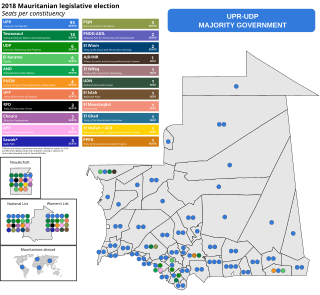
The single transferable vote (STV), sometimes mistakenly conflated with proportional ranked choice voting (P-RCV), is a multi-winner electoral system in which each voter casts a single vote in the form of a ranked-choice ballot. Voters have the option to rank candidates, and their vote may be transferred according to alternate preferences if their preferred candidate is eliminated or elected with surplus votes, so that their vote is used to elect someone they prefer over others in the running. STV aims to approach proportional representation based on votes cast in the district where it is used, so that each vote is worth about the same as another.

Mixed-member proportional representation is a mixed electoral system which combines local majoritarian elections with a compensatory tier of party list votes, which are used to allocate additional members in a way that aims to produce proportional representation overall. In most MMP systems, voters get two votes: one to decide the representative for their single-seat constituency, and one for a political party. Some countries use single vote variants of MMP, although this article focuses primarily on dual vote versions of MMP.
At a national level, Greece holds elections for its legislature, the Hellenic Parliament.

Bolivia elects on national level a head of state – the president – and a legislature. The president and the vice-president are elected for a five-year term by the people. The National Congress has two chambers. The Chamber of Deputies has 130 members, elected for a five-year term using the Additional Member System, and in the case of seven indigenous seats by usos y costumbres. The Chamber of Senators has 36 members: each of the country's nine departments returns four senators allocated proportionally.

The 1930 Alberta general election was held on June 19, 1930, to elect members of the Legislative Assembly of Alberta.

The National Assembly is the directly elected house of the Parliament of South Africa, located in Cape Town, Western Cape. It consists of four hundred members who are elected every five years using a party-list proportional representation system where half of the members are elected proportionally from nine provincial lists and the remaining half from national lists so as to restore proportionality.

Elections in Niger take place within the framework of a semi-presidential system. The President and National Assembly are elected by the public, with elections organised by the Independent National Electoral Commission (CENI).
Elections in Hungary are held at two levels: general elections to elect the members of the National Assembly and local elections to elect local authorities. European Parliament elections are also held every 5 years.

Elections in Togo take place within the framework of a presidential system. Both the President and the National Assembly are directly elected by voters. Togo is a one party dominant state with the Union for the Republic in power.
The Edmonton provincial electoral district also known as Edmonton City from 1905 to 1909, was a provincial electoral district in Alberta, Canada mandated to return members to the Legislative Assembly of Alberta from 1905 to 1917 and again from 1921 to 1959.

The National Assembly is the unicameral legislative house of the Parliament of Mauritania. The legislature currently has 176 deputies, elected for five-year terms in electoral districts or nationwide proportional lists.

Parliamentary elections were held in Hungary on 9 April 2006, with a second round of voting in 110 of the 176 single-member constituencies on 23 April. The Hungarian Socialist Party (MSZP) emerged as the largest party in the National Assembly with 186 of the 386 seats, and continued the coalition government with the Alliance of Free Democrats (SZDSZ). It marked the first time a government had been re-elected since the end of Communist rule. To date, this is the most recent national election in Hungary not won by Fidesz-KDNP, and the last in which the victorious party did not win a two-thirds supermajority in parliament.

Legislative elections were held in South Korea on 26 April 1988. The result was a victory for the ruling Democratic Justice Party (DJP), which won 125 of the 299 seats in the National Assembly. Voter turnout was 75.8%. This was the first time the ruling party did not win a majority in the National Assembly since 1960, the first free and fair elections in Korean history. In January 1990, the DJP merged with other two opposition parties, leaving the Kim Dae-jung-led Peace Democratic Party to be the sole opposition party.

Legislative elections were held in South Korea on 12 February 1985. The result was a victory for the Democratic Justice Party, which won 148 of the 276 seats in the National Assembly. Voter turnout was 84.6%.

Legislative elections were held in South Korea on 8 June 1967. The result was a victory for the Democratic Republican Party, which won 129 of the 175 seats in the National Assembly. Voter turnout was 76.1%.

Legislative elections were held in South Korea on 25 May 1971. The result was a victory for the Democratic Republican Party, which won 113 of the 204 seats in the National Assembly. Voter turnout was 73.2%.

Legislative elections were held in South Korea on 25 March 1981.

Parliamentary elections were held in Burundi on 29 June 2015. The vote had been initially set for 5 June 2015, alongside local elections, but it was delayed due to unrest. Indirect elections to the Senate occurred on 24 July.

Parliamentary elections were held in Mauritania in September 2018; the first round took place on 1 September, with a second round held on 15 September. At the national level, elections were held in 157 constituencies, each electing one member to the National Assembly. Elections were also held in 13 regional councils and 219 municipalities.















